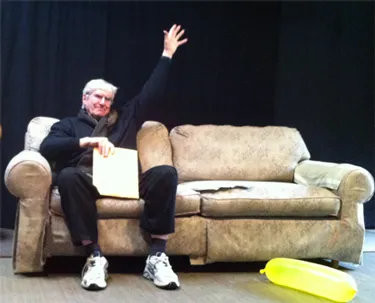As I write a magic show, with a goal to make it more "theatrical," I'm feeling stuck on the most important element of creating a story; how can I change?
When I was first learning Improv (improvisational comedy) I unwittingly stumbled onto a treasure. Keith Johnstone is known around the world as one of the founding fathers of "Impro" and the creator of Theatresports. Performers travel across the globe, spending thousands of dollars, to train with him. It just so happened he founded his world-renowned theatre troupe in the city in which I grew up. I got to take those same workshops in exchange for a few volunteer hours selling popcorn at the Loose Moose Theatre.
Keith was a playwright by trade. While American improv was built on the foundation of fast comedy, Keith's style was rooted in stories.

Keith directed many, many scenes that centered around a living room couch. He delighted in exploring the ordinary.
Keith drilled us on his fundamental elements of a story; Platform, the Tilt, and Change.
1. Establish A Platform
"In a world..."
Every story starts by establishing the everyday situation. It doesn't have to be "normal" to us, but it is the status quo to the people who live there.
2. Tilt
"Until, suddenly..."
Once we understand the calm balanced world, the Tilt is an event, or incident, or realization that throws things out of whack.
3. Change
"...from this day forth."
The tilt causes tension. Eventually balance is regained, through struggle, and the world returns to a new normal. Balanced once again, but forever different.
The basic story, as played out 20 times a night in short improv scenes, was a descent into chaos and return to order. Many times, as young actors in training, we would fail to grasp the "change" part. We would not let the events impact our character. Then Keith might say something like "well, what was the bloody point then?"
So, when we do a magic trick, what is the bloody point?
Most magic tricks have a Platform and Tilt (and, no, I'm not talking about the Depth Illusion) A deck of cards is shown as per usual, then shuffled face up into face down. Order to chaos. Then it is righted, except for the chosen card. Return to order.
But where is the change? (and, no, I'm not talking about the Top Change)
There is no change, because there is no true chaos. You manufacture fake chaos when you shuffle the cards, but it's all in your control.
Before we can open ourselves to change, we must first make ourselves vulnerable by stepping into true chaos, or at least appearing to do so.
How is a magician vulnerable?
Magicians normally behave as gods. They put on frivolous displays of their power over the universe. ZAP! "I can make this wooden rabbit change colour." ZAP! "I will bend this spoon." ZAP! "Where there was one foam ball, there are now two!"
In the fictional world of the magic show, we are in complete control, and in the real world we work to control all the variables to maintain that illusion.
This is why I have been so enamored with the "magician in trouble" plot structure for my routines. It has a platform (trying to perform a trick) and a tilt (something goes terribly wrong) that results in some semi-believable loss of control.
I applied that idea to the classic Triumph card trick by attempting to do a card trick blindfolded. The tilt came when I "accidentally" shuffled the cards face-up into face-down due to my blindness.
In the end, as the cards magically sorted themselves, there was certainly resolution, but was I changed? Having righted the cards was I somehow different?
Nope.
Even with the heightened tension, and entertaining struggle, this story still has no moral.
If I have the power to snap my fingers and set the cards right, then why could I have not done that at any time? Why bother? What's the bloody point?!?!
I don't have the answer.
Years ago I was performing at the Winnipeg Fringe Theatre Festival, and a newspaper reviewer came to see my show. He was the appointed "theatre critic", who regularly commented on all the production in his city. I received a middling review, and his biggest issue was that it was "just a magic show", a series of tricks with a vague sense of theme.
Obviously, that review stuck in my craw, because here I am many years later taking that same show back to a Fringe festival very soon, and having an existential crisis to create a magic show that somehow matters.
I'm working on pushing myself to walk the edge of true random chaos. As an improviser and magician I've occasionally performed without a net, without being sure how a trick was going to end, but this time I might be taking it a bit too far.
If nothing else... maybe it will cause me to change my ways.